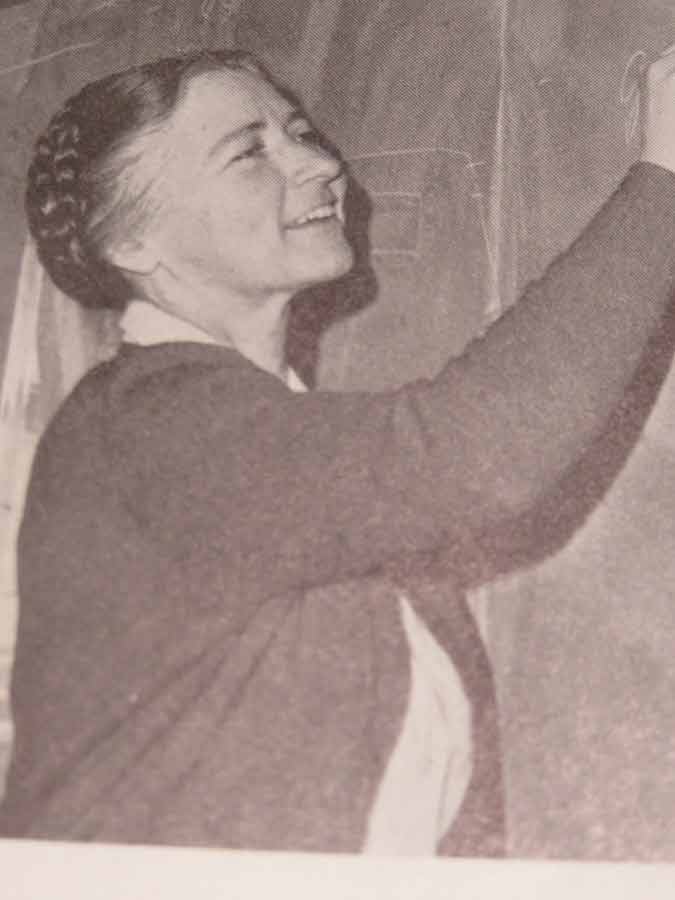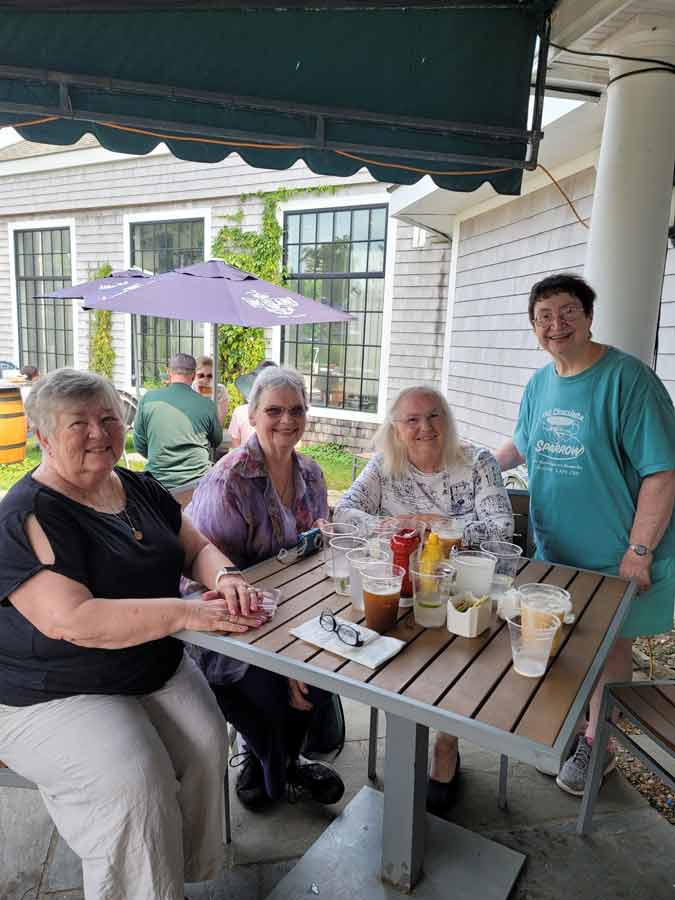
A warm Friday afternoon in August on Cape Cod. A grassy area outside a local brewery offers a summery welcoming space, as does also a canopied flagstone terrace with tables and chairs.
Among all the voices, all the chatter and laughter, you might have heard these words.]
Whan that Aprille with his shoures soote,
The droughte of March hath perced to the roote. . .
Servers swim vertically in and out, delivering trays of brimming golden pints and parecapped plastic drink cups for kids, many of whom are playing tag around the edges. A bunch of spandex-clad guys meet up for lunch and an IPA after cycling. Except for the dog area, nobody’s stressing; over there’s a water bowl around which nervous owners hold their darlings’ leashes tight. (Right now a terrier and some kind of doodle have stiffened and are bristling and growling.) All the while mountains of French fries are getting dipped in catsup then chomped down; over and over, fish tacos and Caesar salad and lobster rolls are being ferried to beach-hungry parties. Yet more brimming glasses go sailing through.
And more of those strange words . . .
And bathed every veyne in swich licour
Of which vertu engendred is the flour. . .
I’m one of four women at a table on the terrace, old friends chatting and catching up on each others’ lives. Two of us live on Cape Cod; the other two have traveled a long way, Lucia a five-hour drive from Maine, and Sally by plane from California. Sadly we’re missing another local friend who’s ill.
Thanne longen folk to goon on pilgrimages . . .
“Longen?” “Licour,” . . . “every veyne. . .”
So what about these strange lines and archaic words? What are they, and so to speak, what were they doing here that August day?
They’re the first lines of the Prologue to Chaucer’s Canterbury Tales, and three old friends and I recited them together that day around our table, as we remembered the great woman who taught us English at Nauset Regional High School, Miss Elisabeth Hooker.

Oh, we also reminisced about other teachers at Nauset. We’d all admired Frank James who directed instrumental music, and Mrs. Dorothy Wordell because we’d sung under her, knew her, or in my case, accompanied her choral groups on piano.
But Miss Hooker was the clear standout. How I wish and hope she could know of our meeting that day! I think she’d have been pleased indeed to see us, less than a mile away from her classroom on the upper floor of what used to be Nauset Regional High School.
I can still hear Miss Hooker’s voice: it was clear, positive, of medium pitch. Steady, in charge, she seldom raised her voice. Hers was a practical voice, and she was a practical, hard-working person, as well as being a imaginative and inspiring teacher. Yet Miss Hooker also had a delightful whimsical side. I remember a conspiratorial gleam in her eye when she once suggested to me, after I’d been to Boston and shared how wildly varied all the people in the subway appeared to me, “I always try to decide what dog breed each person would be!”
I don’t now know Miss Hooker’s personal or particular reasons for teaching Whan that Aprille . . . It could have been simply the desire to take us back to an early source of our language and literature, or the desire to implant a sense of history, by requiring everyone to memorize an in-the-mouth example of how words and usage and pronunciation change over time. Perhaps, too, Miss Hooker felt we would benefit from an invocation, some formal beginning to our study of English literature. After all, Shakespeare, Wordsworth, Coleridge, and Eliot lay ahead.
From Chaucer’s lines that day on the patio, by the way, Mary and I went on to recite Shakespeare’s “Tomorrow and tomorrow and tomorrow/breathes in this petty pace from day to day. . .” from Macbeth.

And who were we, her disciples, now pilgrims? Sue, Lucia, I, and Mary, to name us in the order (from the left) in this photo. That day, our talk ranged from what I might call “the Nurse’s Tales” (Lucia) to my own “The Writer’s Tale and “The Californian’s Tale”—though I’ve tempered my “traveled the greatest distance” award by annual returns to our common ground. Mary could tell, and has, many stories in her books about her life, “The Assessor’s Tale” and “The Justice of the Peace’s’s Tale.” (Her own titles are Old Orleans and Salt in the Veins.) So good is Sue at remembering and stimulating yet more stories, she might be said to have furnished “The Prompter’s Tale, as well as her own “The Fire Chief’s Wife’s Tale.”
Though we hadn’t collectively set out on any official pilgrimage, we had indeed come a metaphorical long way since our graduation in June 1964. And here we were, with the local brewery standing in quite nicely for Chaucer’s Tabard Inn, remembering words our great teacher had engraved on our minds sixty some years before. Still reading and learning “Miss Hooker’s Tale.”

Loved the picture and your Ms. Hooked Memories! Never met her but felt as if I did from your memories back in the day, so to speak.
Sally what an inspiring teacher Miss Hooker was to introduced you to all those amazing writers , Chaucer, Shakespeare, Wordsworth, Coleridge & Eliot. Miss Hooker would have been delighted that you are now an author and still seeing friends you graduated with in 1964.
Carol, thank you. Yes, I was so fortunate to have had Miss Hooker – for three years, too. She believed so in what she was doing, also she herself spoke so well; also she trained us in writing, which several of us have greatly valued over the years. For a small town high school, we were very lucky.
Lovely to hear from you, Carol! Thank you. Sally
Tina, I bet you had some fine teachers at Woodward, too. I do feel intensely privileged to have had Miss Hooker — probably one of the best teachers I ever had. Sally
Do they still make English teachers like this? Mine was a rather severe woman with blood red lipstick, coal black hair and a stern demeanor. No nonsense. And she entered me into a writing contest. I felt she encouraged me behind all that dramatic style. Don’t we wish we could have a conversation with them? Even a small one? Like, “thank you”….
I did visit Miss Hooker many years later, as did several others I know. Will share that with you sometime. She does certainly appear to have been more “user friendly” than the teacher you describe. I’ve written more about Miss H., but too long for a blog piece. Having had three particularly fine teachers in high school, I was so fortunate.
Do you still have the contest writing? What was it? I’d love to know!
Thanks for commenting —- Sally